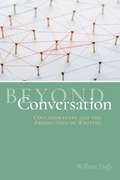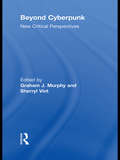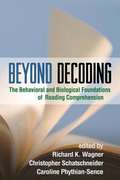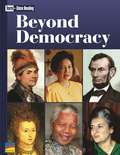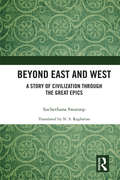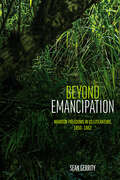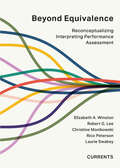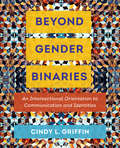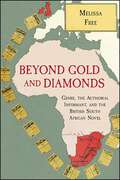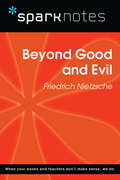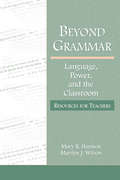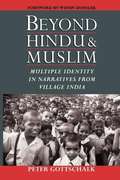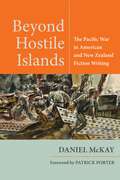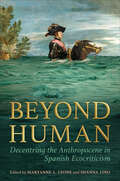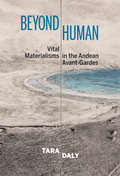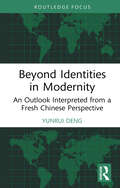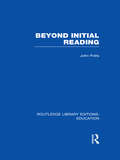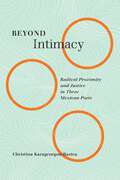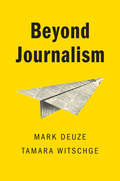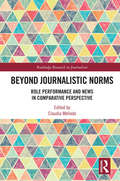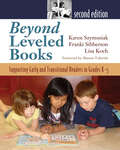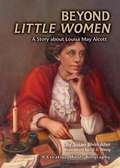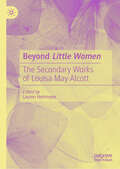- Table View
- List View
Beyond Conversation: Collaboration and the Production of Writing
by William DuffyCollaboration was an important area of study in writing for many years, but interest faded as scholars began to assume that those working within writing studies already “got it.” In Beyond Conversation, William Duffy revives the topic and connects it to the growing interest in collaboration within digital and materialist rhetoric to demonstrate that not only do the theory, pedagogy, and practice of collaboration need more study but there is also much to be learned from the doing of collaboration. While interrogating the institutional politics that circulate around debates about collaboration, this book offers a concise history of collaborative writing theory while proposing a new set of commonplaces for understanding the labor of coauthorship. Specifically, Beyond Conversation outlines an interactionist theory that explains collaboration as the rhetorical capacity that manifests in the discursive engagements coauthors enter into with the objects of their writing. Drawing on new materialist philosophies, post-qualitative inquiry, and interactionist rhetorical theory, Beyond Conversation challenges writing and literacy educators to recognize the pedagogical benefits of collaborative writing in the work they do both as writers and as teachers of writing. The book will reinvigorate how teachers, scholars, and administrators advocate for the importance of collaborative writing in their work.
Beyond Cyberpunk: New Critical Perspectives (Routledge Studies In Contemporary Literature Ser. #3)
by Graham J. MurphyThis book is a collection of essays that considers the continuing cultural relevance of the cyberpunk genre into the new millennium. Cyberpunk is no longer an emergent phenomenon, but in our digital age of CGI-driven entertainment, the information economy, and globalized capital, we have never more been in need of a fiction capable of engaging with a world shaped by information technology. The essays in explore our cyberpunk realities to soberly reconsider Eighties-era cyberpunk while also mapping contemporary cyberpunk. The contributors seek to move beyond the narrow strictures of cyberpunk as defined in the Eighties and contribute to an ongoing discussion of how to negotiate exchanges among information technologies, global capitalism, and human social existence. The essays offer a variety of perspectives on cyberpunk’s diversity and how this sub-genre remains relevant amidst its transformation from a print fiction genre into a more generalized set of cultural practices, tackling the question of what it is that cyberpunk narratives continue to offer us in those intersections of literary, cultural, theoretical, academic, and technocultural environments.
Beyond Decoding
by Richard Wagner Christopher SchatschneiderWhat cognitive processes and skills do children draw on to make meaning from text? How are these capacities consolidated over the course of development? What puts some learners at risk for comprehension difficulties? This authoritative volume presents state-of-the-science research on the behavioral and biological components of successful reading comprehension. Uniquely integrative, the book covers everything from decoding, fluency, and vocabulary knowledge to embodiment theory, eye movements, gene environment interactions, and neurobiology. The contributors are prominent investigators who describe their methods and findings in depth and identify important implications for the classroom.
Beyond Democracy (Texts For Close Reading Ser.)
by Benchmark Education Co. LLC StaffNIMAC-sourced textbook
Beyond East and West: A Story of Civilization through the Great Epics
by Suchethana SwaroopThis volume is a cross-cultural study of the evolution of civilisation. Drawing its material and inspiration from literature and culture, it looks at the achievements of humankind as a single imaginative experience. The book examines how traditions of poetry and literature have shaped cultures, societies and civilisations, and their inter-relatedness. Analysing stereotypes in Asia and Europe, the author raises questions fundamental to our perceptions of culture, democracy, and language. He throws light on dominant languages and languages cast aside by the tides of history, and attributes the status of English as a 'world language' to ideas propagated in the great epics of the West — particularly Roman — and the poetic heritage shaped by them. Discussing the fallout of that dream on other cultures and ‘non-technical’ languages of the world, this book investigates questions of legitimacy and desirability of a single language or culture becoming universal. A sensitive and nuanced work, it promises a good read for general readers as well as researchers interested in world literature, comparative literature, sociology and cultural studies, in the interaction between science and art, and in the forces that shape the world order.
Beyond Emancipation: Maroon Freedoms in US Literature, 1850–1862 (SUNY series in Multiethnic Literatures)
by Sean GerrityExplores how African American literary representations of maroons in the decade leading up to the Civil War complicate conventional narratives and geographies of slavery and freedom in the United States.Beyond Emancipation revisits classic works of nineteenth-century American literature, especially by Black writers, to uncover a hidden history of maroons-enslaved people who ran away but remained hidden in the South. Sean Gerrity argues that literary depictions of "small acts" of marronage reveal an expanded sense of what freedom might look like and where and when it might occur. While taking care not to romanticize historical realities, Gerrity vividly shows how works by Frederick Douglass, Harriet Jacobs, and Martin Delany gesture toward possibilities for Black freedom-making beyond legal emancipation, liberalism, and the white abolitionist literary tradition passed down from Harriet Beecher Stowe. While Beyond Emancipation focuses on texts produced during the brief period between the Fugitive Slave Act of 1850 and the Civil War, the book's range of reference and implications are broad, unsettling still dominant ideas and engaging pressing questions in literary criticism, history, geography, and Black studies.
Beyond Equivalence: Reconceptualizing Interpreting Performance Assessment
by Robert G. Lee Christine Monikowski Elizabeth A. Winston Laurie Swabey Rico PetersonThere is a longstanding need for valid, reliable measurements of interpreting competence. Although rubrics and checklists are commonly used in both academic and employment settings, a review of available rubrics indicates that many do not focus on interpreting performance. Traditional metrics for sign language interpreting often conflate language proficiency with interpreting proficiency. Conflating fundamental aspects of language in use—vocabulary, grammar, and prosody— with fundamental aspects of interpretation—content, intent, and monitoring—compromises the valid assessment of interpreting proficiency. Beyond Equivalence: Reconceptualizing Interpreting Performance Assessment argues for a shift toward more nuanced and evidence-based conceptualizations of interpreting, communication, and meaning to improve the creation and use of rubrics for assessment in interpreter education, certification, and professional development. This inaugural volume in the Currents series introduces a rubric and accompanying scale, which can be used to assess both simultaneous and consecutive interpreting performance in terms of both process and product, in both signed and spoken language interpreting, and in a variety of settings. Beyond Equivalence offers an appreciation of the multivarious nature of meaning in the interpreting process and presents a new paradigm for the measurement of interpreting proficiency.
Beyond Fitting In: Rethinking First-Generation Writing and Literacy Education
by Kelly RitterBeyond Fitting In interrogates how the cultural capital and lived experiences of first-generation college students inform literacy studies and the writing-centered classroom. Essays, written by scholar-teachers in the field of rhetoric and composition, discuss best practices for teaching first-generation students in writing classrooms, centers, programs, and other environments. The collection considers how first-gen students of different demographics interact with and affect literacy instruction in a variety of public and private, rural and urban schools offering two- or four-year programs, including Hispanic-serving institutions, historically Black colleges and universities, and public research universities. By exploring the experiences of students, teachers, writing program administrators, and writing center directors, the volume gives readers an inside view of the practices and structures that shape the literacy of first-generation students.
Beyond Gender Binaries: An Intersectional Orientation to Communication and Identities
by Cindy L. GriffinBeyond Gender Binaries uses a feminist, intersectional, and invitational approach to understanding identities and how they relate to communication. Taking readers outside the familiar binary constructions of gender and identity, Cindy L. Griffin addresses—through a feminist intersectional lens—communication, identity, power and privilege, personhood and citizenship, safety in public and private spaces, and hegemony and colonialism. Twelve chapters focus on critical learning through careful exploration of key terms and concepts. Griffin illustrates these with historical and contemporary examples and provides concrete guides to intersectional approaches to communication. This textbook highlights not just the ways individuals, systems, structures, and institutions use communication to privilege particular identities discursively and materially, but also the myriad ways that communication can be used to disrupt privilege and respectfully acknowledge the nonbinary and intersectional nature of every person’s identity. Key features include: Intersectional approaches to explaining and understanding identities and communication are the foundation of each chapter and inform the presentation of information throughout the book.Contemporary and historical examples are included in every chapter, highlighting the intersectional nature of identity and the role of communication in our interactions with other people.Complex and challenging ideas are presented in clear, respectful, and accessible ways throughout the book.
Beyond Gold and Diamonds: Genre, the Authorial Informant, and the British South African Novel (SUNY series, Studies in the Long Nineteenth Century)
by Melissa FreeBeyond Gold and Diamonds demonstrates the importance of southern Africa to British literature from the 1880s to the 1920s, from the rise of the systematic exploitation of the region's mineral wealth to the aftermath of World War I. It focuses on fiction by the colonial-born Olive Schreiner, southern Africa's first literary celebrity, as well as by H. Rider Haggard, Gertrude Page, and John Buchan, its most influential authorial informants, British authors who spent significant time in the region and wrote about it as insiders. Tracing the ways in which generic innovation enabled these writers to negotiate cultural and political concerns through a uniquely British South African lens, Melissa Free argues that British South African literature constitutes a distinct field, one that overlaps with but also exists apart from both a national South African literary tradition and a tradition of South African literature in English. The various genres that British South African novelists introduced—the New Woman novel, the female colonial romance, the Rhodesian settler romance, and the modern spy thriller—anticipated metropolitan literary developments while consolidating Britain's sense of its own dominion in a time of increasing opposition.
Beyond Good and Evil (SparkNotes Philosophy Guide)
by SparkNotesBeyond Good and Evil (SparkNotes Philosophy Guide) Making the reading experience fun! SparkNotes Philosophy Guides are one-stop guides to the great works of philosophy–masterpieces that stand at the foundations of Western thought. Inside each Philosophy Guide you&’ll find insightful overviews of great philosophical works of the Western world.
Beyond Grammar: Resources for Teachers (Language, Culture, and Teaching Series)
by Mary R. Harmon Marilyn J. WilsonBeyond Grammar: Language, Power, and the Classroom asks readers to think about the power of words, the power of language attitudes, and the power of language policies as they play out in communities, in educational institutions, and in their own lives as individuals, teachers, and participants in the larger community. Each chapter provides extended discussion of a set of critical language issues that directly affect students in classrooms: the political nature of language, the power of words, hate language and bullying, gender and language, dialects, and language policies. Written for pre-service and practicing teachers, this text addresses how teachers can alert students to the realities of language and power--removing language study from a “neutral” corner to situate it within the context of political, social, and cultural issues. Developing a critical pedagogy about language instruction can help educators understand that classrooms can either maintain existing inequity or address and diminish inequity through critical language study. A common framework structures the chapters of the text: * Each chapter begins with an overview of the language issue in question, and includes references for further research and for classroom use, and provides applications for classroom teachers.* Numerous references to the popular press and the breadth of language issues found therein foreground current thought on socio-cultural language issues, attitudes, standards, and policies found in the culture(s) at large.* References to current and recent events illustrate the language issue’s importance, cartoons address the issue, and brief “For Thought” activities illustrate the point being discussed and extend the reader’s knowledge and awareness.* “Personal Explorations” ask readers to go beyond the text to develop further understanding; “Teaching Explorations” ask teachers to apply chapter content to teaching situations. Beyond Grammar: Language, Power, and the Classroom is intended for undergraduate and master’s level courses that address literacy education, linguistics, and issues of language and culture.
Beyond Greek: The Beginnings of Latin Literature
by Denis FeeneyAncient Roman authors are firmly established in the Western canon, and yet the birth of Latin literature was far from inevitable. The cultural flourishing that eventually produced the Latin classics was one of the strangest events in history, as Denis Feeney demonstrates in this bold revision.
Beyond Hindu and Muslim: Multiple Identity In Narratives From Village India
by Wendy Doniger Peter Gottschalk"The book offers a deep and meticulous ethnography of persons talking about who they are--in relation to a particular place or set of places, situated both in time and space. This book achieves a rare balance between accessibility and richness." --Journal of the American Oriental Society "In South Asia's current climate, in which forces of religious revivalism have taken violent turns, it is more than ever necessary to understand how Indians' multiple identities actually work. Gottschalk's carefully researched monograph provides an excellent starting point; it deserves a wide readership."
Beyond Hostile Islands: The Pacific War in American and New Zealand Fiction Writing (World War II: The Global, Human, and Ethical Dimension)
by Daniel McKayWINNER, JAVIER COY BIENNIAL RESEARCH AWARD, BEST MONOGRAPHOffers a fascinating window into how the fraught politics of apology in the East Asian region have been figured in anglophone literary fiction.The Pacific War, 1941-1945, was fought across the world’s largest ocean and left a lasting imprint on anglophone literary history. However, studies of that imprint or of individual authors have focused on American literature without drawing connections to parallel traditions elsewhere. Beyond Hostile Islands contributes to ongoing efforts by Australasian scholars to place their national cultures in conversation with those of the United States, particularly regarding studies of the ideologies that legitimize warfare. Consecutively, the book examines five of the most significant historical and thematic areas associated with the war: island combat, economic competition, internment, imprisonment, and the atomic bombing of Hiroshima and Nagasaki.Throughout, the central issue pivots around the question of how or whether at all New Zealand fiction writing differs from that of the United States. Can a sense of islandness, the ‘tyranny of distance,’ Māori cultural heritage, or the political legacies of the nuclear-free movement provide grounds for distinctive authorial insights? As an opening gambit, Beyond Hostile Islands puts forward the term ‘ideological coproduction’ to describe how a territorially and demographically more minor national culture may accede to the essentials of a given ideology while differing in aspects that reflect historical and provincial dimensions that are important to it. Appropriately, the literary texts under examination are set in various locales, including Japan, the Solomon Islands, New Zealand, New Mexico, Ontario, and the Marshall Islands. The book concludes in a deliberately open-ended pose, with the full expectation that literary writing on the Pacific War will grow in range and richness, aided by the growth of Pacific Studies as a research area.
Beyond Human: Decentring the Anthropocene in Spanish Ecocriticism (Toronto Iberic #83)
by Maryanne L. Leone Shanna LinoChronicling sixteenth-century Spain to the present day, Beyond Human aims to decentre the human and acknowledge the material historicity of more-than-human nature. The book explores key questions relating to ecological equity, justice, and responsibility within and beyond Spain in the Anthropocene. Examining relations between Iberian cultural practices, historical developments, and ecological processes, Maryanne L. Leone, Shanna Lino, and the contributors to this volume reveal the structures that uphold and dismantle the non-human–human dichotomy and nature-culture divide. The book critiques works from the Golden Age to the twenty-first century in a wide range of genres, including comedia, royal treatises, agricultural reports, paintings, satirical essays, horror fiction and film, young adult and speculative literature, poetry, graphic novels, and television series. The authors contend that Spanish cultural studies must expose the material historicity that entangles today’s ecological crises and ecosocial injustices with previous, future, and contemporary entities. The book argues that this will require the simultaneous decentring of the human and of the Anthropocene as an ecocritical framework. By standardizing ecosocial analysis and widening avenues for ecopedagogical approaches, Beyond Human participates in the ecocentric transformation of Hispanic cultural studies.
Beyond Human: Vital Materialisms in the Andean Avant-Gardes (Bucknell Studies in Latin American Literature and Theory)
by Tara DalyIn the Andes, indigenous knowledge systems based on the relationships between different beings, both earthly and heavenly, animal and plant, have been central to the organization of knowledge since precolonial times. The legacies of colonialism and the continuance of indigenous cultures makes the Andes a unique place from which to think about art and social change as ongoing, and as encompassing more than an exclusively human perspective. Beyond Human revises established readings of the avant-gardes in Peru and Bolivia as humanizing and historical. By presenting fresh readings of canonical authors like César Vallejo, José María Arguedas, and Magda Portal and through analysis of newer artist-activists like Julieta Paredes, Mujeres Creando Comunidad, and Alejandra Dorado, Daly argues instead that avant-gardes complicate questions of agency and contribute to theoretical discussions on vital materialisms: the idea that life happens between animate and inanimate beings—human and non-human—and is made sensible through art. Published by Bucknell University Press. Distributed worldwide by Rutgers University Press.
Beyond Identities in Modernity: An Outlook Interpreted from a Fresh Chinese Perspective
by Yunrui DengThis book argues that future generations of modernity as a whole will shape participatory modernization whether Chinese modernization or Western modernization. The public discourse is inundated with the good and the bad modern events with the acceleration of globalization.This book debates that the biggest question in the twenty-first century is not who will dominate, touting a new world order upon us, but rather that it is the orientation of modernization that haunts our daily realities. This book explores the idea that life is not about living for an identity in any society, it is about the demands for dignity and safety. It goes further to state that there is also a demand for the power of being, and these three elements are beyond identities as modernization moves forward. Interdisciplinary in nature, the book uses theories, data, and philosophy as toolboxes to align with microrealities around the globe. Witnessing modernization and modernizing identities in China and in Australia beyond day by day, the author provides a more suitable, more realistic, and possibly, more nuanced perspective.This book will be of interest to professionals, students, academics, as well as businesspeople with China experience, interested in modernization and identity, the Chinese perspective, and the new generation of Chinese.
Beyond Initial Reading (Routledge Library Editions: Education)
by John PottsThis book sets out a clear and logical framework for the teaching of reading throughout different age groups, whereby systematic progression can be developed within a structured framework. A detailed set of recommendations are offered and are both illustrated and justified, for the teacher to examine and use. Much has been written about the importance of skilled and efficient reading and language usage in the early years of education, but all too few teachers are aware of the need for the development of reading skills in an ordered sequence with older children as well. Problems such as the motivation of the learner, the place of reading in a mass media age, the extent and classification of reading failure and the diagnosis of reading problems are examined, and the complexities of the linguistic background and of linguistic deprivation are covered thoroughly.
Beyond Intimacy: Radical Proximity and Justice in Three Mexican Poets (McGill-Queen's Iberian and Latin American Cultures Series)
by Christina Karageorgou-BasteaThe ethos of poetry and its social efficacy cannot be underestimated in the quest for a fair society. The works of three contemporary Mexican poets – Abigael Bohórquez, Myriam Moscona, and Gloria Gervitz – offer models for examining important philosophical and literary questions that explore the relationship between art and the enactment of justice. Beyond Intimacy returns lyric poetry to the centre of struggles for justice within concrete historical frameworks, highlighting gender, ethnic, and cultural tensions. Through an analysis of works by these three poets, Christina Karageorgou-Bastea reveals the far-reaching social transcendence of poetry; she shows that lyric poetry invites a public dialogue where queer pariahs model citizenship, a dying language guards and transmits tradition, and the end of motherhood is the cusp in the struggle for woman’s freedom. The radicalization of intimacy, the relationship par excellence between self and other on which poetic interaction is based, has the power to dismantle deeply rooted hierarchies within art and society. Karageorgou-Bastea explores poetry’s potential for justice through different modes of intimacy including desire, filiation, and mourning.Meeting on the grounds of their aspiration to harmony, lyricism, and justice-making lead the way to social equity and fairness in Beyond Intimacy.
Beyond Journalism
by Mark Deuze Tamara WitschgeIn the context of profound transformations in the professional, business, technological and social context of journalism, it is crucial for journalism studies and education to move beyond limited approaches to the discipline. Among the most significant changes affecting journalism worldwide is the emergence of startup culture, as more and more journalists strike out on their own. In Beyond Journalism, Deuze and Witschge combine extensive global and comparative fieldwork. Through rich case studies of journalism startups around the world, they provide deep insight into the promises and pitfalls of media entrepreneurship. Ultimately, they aim to recognize new and emerging voices as legitimate participants in the discourse about what journalism is, can be and should be. A bold manifesto as well as an in-depth empirical study, this book is essential reading for students and scholars of journalism, media, communication, and related disciplines.
Beyond Journalistic Norms: Role Performance and News in Comparative Perspective (Routledge Research in Journalism)
by Claudia MelladoBeyond Journalistic Norms contests and challenges pre-established assumptions about a dominant type of journalism prevailing in different political, economic, and geographical contexts to posit the fluid, and dynamic nature of journalistic roles. The book brings together scholars from Western and Eastern Europe, North America, Latin America, and Asia, reporting findings based on data collected from democratic, transitional, and non-democratic contexts to produce thematic chapters that address how journalistic cultures vary around the globe, specifically in relation to challenges that journalists face in performing their journalistic roles. The study measures, compares, and analyzes the materialization of the interventionist, the watchdog, the loyal-facilitator, the service, the infotainment, and the civic roles in more than 30,000 print news stories from 18 countries. It also draws from hundreds of surveys with journalists to explain the link between ideals and practices, and the conditions that shape this divide. This book will be of great relevance to scholars and researchers working in the fields of journalism, journalism practices, philosophy of journalism, sociology of media, and comparative journalism research.
Beyond Leveled Books: Supporting Early and Transitional Readers in Grades K-5
by Lisa Koch Franki Sibberson Karen SzymusiakIn Beyond Leveled Books, Second Edition, Franki Sibberson, Karen Szymusiak, and Lisa Koch provide even more resources to help teachers understand and meet the needs of transitional readers. The key topic of series books has been revised and enlarged, with charts outlining new series with the challenges they pose and supports readers need. New lessons have been added, and most chapters now include a related article from a literacy expert. Some of the contributors include Kathy Collins, Larry Swartz, and Mary Lee Hahn.Leveled books are an indispensable tool for teaching children to read, especially for emergent readers, but the authors of Beyond Leveled Books are sounding the alarm about the overuse and misuse of leveling and the way it restricts teacher autonomy and undermines student choice and reading engagement. The authors lay out a blueprint for using leveled books effectively within a student-centered and differentiated approach that is designed to motivate all readers, particularly transitional ones. Teaching Transitional Readers: Beyond Leveled Books is packed with resources to help teachers understand and meet the needs of transitional readers, including examples of classroom instruction, sample mini-lessons, strategies for small-group instruction, assessment techniques, and articles by literacy expertsResources for K-5 Classrooms: The book explores the uses and limitations of leveled texts in primary reading instruction, including ideas for how to organize your classroom library and a list of great books and series to use alongside leveled text in supporting new readersGateway to Independent Reading: The authors provide explicit tools for helping students consolidate their skills and reading strategies, to read widely and deeply, to increase their vocabulary, and build critical thinkingMaking Reading Fun: Teach students to experience joy from reading through deeper comprehension and applicationBeyond Leveled Books is an essential resource for K-5 teachers looking to help all readers, including budding readers, struggling readers, transitional readers, and readers who have plateaued.
Beyond Little Women: A Story about Louisa May Alcott
by Susan Bivin AllerA biographical account of the life of Louisa May Alcott.
Beyond Little Women: The Secondary Works of Louisa May Alcott
by Lauren HehmeyerThis collection concentrates on the secondary works of Louisa May Alcott and looks at the idea that Alcott was as heavily influenced by her times as by her transcendentalist upbringing. Her work often subverts the conventional and includes the new, the practical, and the real. The sections include: (1) the gothic and the monstrous feminine, (2) the theme of useful work, (3) the themes of physical and mental health, and (4) Alcott’s philosophy concerning creativity and genius. Contributors emphasize Alcott’s belief in women’s agency and argue that Alcott can be considered as a brilliant bridge between the Transcendental idealism of the early nineteenth century and later reforms.
